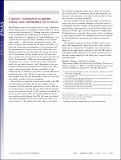A genetic perspective on gender, culture, and mathematics performance
Author(s)
Strauss, Bernard S.; Strauss, Jacob A.
DownloadStrauss-2009-A genetic perspectiv.pdf (65.33Kb)
PUBLISHER_POLICY
Publisher Policy
Article is made available in accordance with the publisher's policy and may be subject to US copyright law. Please refer to the publisher's site for terms of use.
Terms of use
Metadata
Show full item recordAbstract
Both biological and social scientists have recently commented on the supposed greater variability of males in IQ tests and in mathematical achievement (1). Missing from these discussions is any consideration of possible genetic mechanisms that might be involved. To paraphrase Sir Arthur Eddington, “it is a good rule not to put overmuch confidence in the observational results … until they are confirmed by theory.” But there is a theory that accounts for the observed results (2, 3). Given the mechanism of mammalian sex determination and the phenomenon of X inactivation, males will be more variable than females for any traits affected by genes located on the X chromosome. For any number of loci, the male variance is greater than the female by the fraction of loci that are on the X chromosome. If IQ were determined solely by genetic factors, the variance ratio between males and females could take any value between 1 and 2 depending on the proportion of relevant genes found on the X chromosome. The genetic explanation predicts that there should be female mathematicians as talented as any males or female dullards as untalented as any male. All that is required is a sufficiently large sample to permit such individuals to show up. Increased accessibility provides this larger population.
Date issued
2009-09Department
Massachusetts Institute of Technology. Computer Science and Artificial Intelligence Laboratory; Massachusetts Institute of Technology. Department of Electrical Engineering and Computer ScienceJournal
Proceedings of the National Academy of Sciences of the United States of America
Publisher
United States National Academy of Sciences
Citation
Strauss, Bernard S, and Jacob A Strauss. “A genetic perspective on gender, culture, and mathematics performance.” Proceedings of the National Academy of Sciences 106.37 (2009): E101-E101. © 2009 National Academy of Sciences
Version: Final published version
ISSN
1091-6490
0027-8424